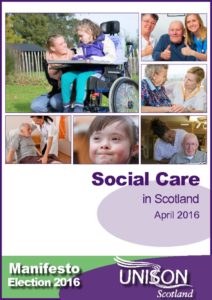 Social care in Scotland is in crisis! The provision of social care has changed rapidly over the last 20 years, but our elderly population is expected to rise by 82% by the year 2035 and this requires a change in funding, greater joint planning and an emphasis on preventative spending. There needs to be better, more imaginative funding for the elderly. Fully funded health and care services, free at the point of use are needed.
Social care in Scotland is in crisis! The provision of social care has changed rapidly over the last 20 years, but our elderly population is expected to rise by 82% by the year 2035 and this requires a change in funding, greater joint planning and an emphasis on preventative spending. There needs to be better, more imaginative funding for the elderly. Fully funded health and care services, free at the point of use are needed.
There have been various initiatives for better provision for health and social care over the past 20 years, since the first Local Health Care Cooperatives were set up in 1999. Integration has worked well in a few areas, but less well in others during their various incarnations. The recent Public Bodies (Joint Working) Act 2014, which came into full effect on 1 April 2016 is the latest attempt to ensure a joined up, seamless transition between hospitals and social work departments, bring into legislation joint budgets, overseen by Joint Integration Boards under a Chief Officer.
Bed blocking is caused when elderly patients have finished their hospital treatment but are unable to be discharged due to a lack of care packages in place. It costs around £2,500 for a week’s stay in a hospital but only £500-£800 per week for a care home and even less for care in the home. The current number of patients in hospital across Scotland, who don’t need to be, is the equivalent of the number of beds in the new Queen Elizabeth II Hospital in Glasgow. Councils need to be properly funded to deliver the quality and capacity of social care to get them into social settings.
UNISON has long supported the principle of free personal care. Spending on this has increased by more than 160% since the policy was introduced, and is now well over £350m. The number of people receiving personal care has increased on a yearly basis since it was introduced and there needs to be proper funding in place to continue to cater for their needs. Free personal care is currently only used to support elderly people over 65, but it should be available to those under 65 and to disabled people who need support and care in their homes.
All social care is delivered by people, whether informal carers or care workers, they are not robots. Improving the quality of care means seriously addressing workforce issues, the most important of which is pay. Despite the introduction of the Chancellor’s new UK ‘Living’ Wage which sets an hourly rate of £7.20 for workers aged 25 and over, many employers do not pay for time to travel between visits or make other cuts to terms and conditions. UNISON believes that all providers should be required to pay the Scottish Living Wage (currently £8.25 in Scotland) through the procurement process.
Fair pay is only one aspect of fair work and quality care. UNISON’s Ethical Care Charter and subsequent report “Scotland – It’s Time to Care” highlighted unfair conditions of service, such as lack of training and induction, working on zero-hours or nominal hours contracts and lack of time to care properly, which all adds to stress on the workforce. There is also a need to ensure that adequate travel time, travel costs and other expenses, such as mobile phones to ensure workers’ safety are properly provided to the staff.
Through our surveys and reports we have urged councils to implement the Ethical Care Charter, and although only a few have implemented it in its entirety, several have adopted aspects, with a view to its total implementation in the future.
Care workers have strong views about the quality of care they want to deliver and their lack of ability to do it. 15 minute visits are rarely adequate. Staff should be able to spend enough time with their clients and improve the quality of care they can provide.
Social care plays a vital and growing role in our society. Increasing demand, falling real terms funding and increasingly complex care needs has put the sector under significant strain. We need a social care system that can meet the requirements of our ageing population and we therefore, need to invest in the workforce that provides it.
